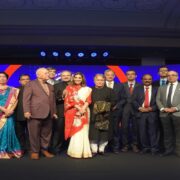AVEVA will demonstrate at COP28 how leveraging data in a connected industrial economy can accelerate the path towards a sustainable future.
AVEVA is a gold sponsor of the International Chamber of Commerce pavilion within the Blue Zone of the United Nations Conference of the Parties, in Dubai, UAE, with the aspiration of building bridges between developed economies and the global south.
AVEVA’s leaders will highlight how digital solutions can minimize CO² emissions of existing industrial infrastructure while maximizing efficiency across the value chain and delivering measurable cost savings that can be reinvested in clean technologies.
AVEVA’s delegation at COP28 will be led by CEO Caspar Herzberg along with Lisa Wee, Head of Global Sustainability; Harpreet Gulati, Senior Vice President, Head of PI System Business; Evgeny Fedotov, Senior Vice President, EMEA; and Nayef Bou Chaaya, Vice President MEA.
Caspar Herzberg, CEO of AVEVA, said: “The world must dramatically cut waste. The industrial sector accounts for a quarter of global emissions. Every day, our customers prove that digitalization enables industrial companies to drive measurable carbon reductions, including for traditionally energy-intensive industries. At AVEVA, our ambition is to accelerate low-carbon innovation, and to drive circularity and efficiency across the value chain. We want the software we create to transform how industries are designed and how they operate, to accelerate climate action and reduce inequalities. Forging partnerships with businesses, governments and civil society leaders here at COP is critical to build forward-thinking, collective solutions that accelerate climate action, worldwide.”
Evgeny Fedotov, Senior Vice President, EMEA, at AVEVA, added: “Collaboration is essential to driving efficient global value chains – collective action is also essential to drive decarbonization. This is why we want to be part of the conversation at COP28 to advance necessary and inclusive climate progress by building bridges across international communities.
“As a driving force toward a more sustainable world, COP28 is a milestone moment for the world to take stock of its progress on the Paris Agreement. We are eager to engage with world leaders, governments, and our technology peers, to drive insightful discussions on how together, we can accelerate the transition to a sustainable future.”
Nayef Bou Chaaya, Vice President MEA at AVEVA, said: “While AVEVA helps industrial customers optimize their existing processes and operations, we drive innovation, opening up new industry frontiers, that leverage emerging green technologies. Our software empowers teams with connected insights so that they can make the best decisions at speed, ensuring the resilience and efficiency that in turn drive sustainable success. The positive impact our solutions bring to customers is our single biggest opportunity to make a difference in the world.”
Lisa Wee, Head of Global Sustainability at AVEVA said: “At AVEVA we want to lead by example in the fight against climate change. We have already cut our scope 1 and 2 GHG emissions by 93% and we are actively working to reduce the environmental impacts of our value chain. We have made significant progress in delivering solutions that are low carbon by design and have in-built capabilities to enable industries to decarbonize, drive circularity and adapt to the impacts of global warming.”
“Exchanging insights and forging partnerships with forward-thinking businesses, governments and civil society leaders is critical to finding solutions that increase the scale and scope of climate action across the globe. COP28 is an ideal forum to have these discussions, given the breadth of stakeholders convened alongside key national and international policymakers capable of actively contributing to our collective endeavor for decarbonization.”
Harpreet Gulati, Senior Vice President, and Head of PI System Business at AVEVA, said: “Harnessing the potential of green hydrogen could avoid up to 80 gigatons of cumulative CO² emissions by 2050, contributing to as much as 20% of total abatement required to drive the net-zero economy. The hydrogen sector will require a new transportation, distribution, and regulatory approach to operate successfully as an alternative fuel. Combining this with the latest digital twin and AI-enhanced capabilities, industries can discover new paths to drive efficiency and decarbonize.”







